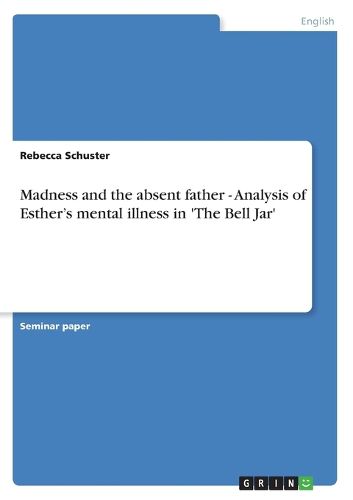Readings Newsletter
Become a Readings Member to make your shopping experience even easier.
Sign in or sign up for free!
You’re not far away from qualifying for FREE standard shipping within Australia
You’ve qualified for FREE standard shipping within Australia
The cart is loading…






Seminar paper from the year 2005 in the subject English Language and Literature Studies - Literature, grade: 67 (1-2), Keele University, course: Contemporary American Fiction, 8 entries in the bibliography, language: English, abstract: The following essay deals with the book The Bell Jar by Sylvia Plath. It will try to show that Esther’s madness is profoundly linked to her social environment. This on the other hand is in several ways deeply connected with Esther’s loss of her father in her childhood. That is, the absence of her father correlates with Esther’s behaviour towards her surroundings and her life attitudes. To prove that fact this essay will try to work out the turning point in Esther’s life that leads to the final break-out of her illness and her mental spiral down movement that leads her into a psychiatric institution. 1. DIAGNOSIS Esther suffers from a severe case of depression that might have been caused by a genetic defect; but as opposed to Sylvia Plath, from who is known that in her family were reported cases of depression on her father’s side, one finds only insufficient hints (that really only serve as foreshadows for the things to happen in the story) that the same is true for Esther, for example her comment about her father’s provenance: My German-speaking father, dead since I was nine, came from some manic-depressive hamlet in the black heart of Prussia. The reader, who does not know about the book’s autobiographical background and Plath’s medical history, must consequently assume that Esther’s worsening disease is entirely caused by her social environment. This notion is not devious at all.
$9.00 standard shipping within Australia
FREE standard shipping within Australia for orders over $100.00
Express & International shipping calculated at checkout
Seminar paper from the year 2005 in the subject English Language and Literature Studies - Literature, grade: 67 (1-2), Keele University, course: Contemporary American Fiction, 8 entries in the bibliography, language: English, abstract: The following essay deals with the book The Bell Jar by Sylvia Plath. It will try to show that Esther’s madness is profoundly linked to her social environment. This on the other hand is in several ways deeply connected with Esther’s loss of her father in her childhood. That is, the absence of her father correlates with Esther’s behaviour towards her surroundings and her life attitudes. To prove that fact this essay will try to work out the turning point in Esther’s life that leads to the final break-out of her illness and her mental spiral down movement that leads her into a psychiatric institution. 1. DIAGNOSIS Esther suffers from a severe case of depression that might have been caused by a genetic defect; but as opposed to Sylvia Plath, from who is known that in her family were reported cases of depression on her father’s side, one finds only insufficient hints (that really only serve as foreshadows for the things to happen in the story) that the same is true for Esther, for example her comment about her father’s provenance: My German-speaking father, dead since I was nine, came from some manic-depressive hamlet in the black heart of Prussia. The reader, who does not know about the book’s autobiographical background and Plath’s medical history, must consequently assume that Esther’s worsening disease is entirely caused by her social environment. This notion is not devious at all.